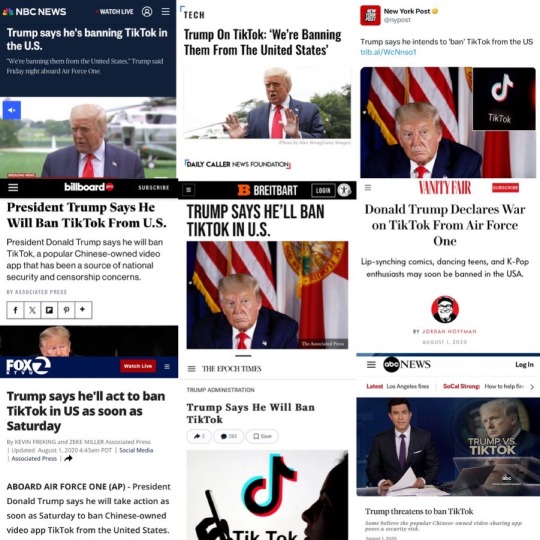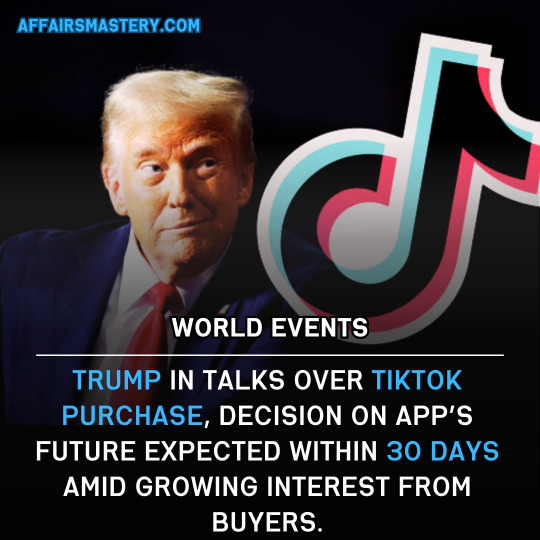#ByteDance
Explore tagged Tumblr posts
Text

(Source)
TikTok chose to shut down US access both earlier than the federal ban mandated (it would start tomorrow, 1/19/25) and in a further-reaching manner than the ban intended (it would have prevented Apple & Google from allowing updates but left the app intact on people's phones).
#destiel#tiktok#tiktok ban#usa#us politics#censorship#bytedance#castiel#dean winchester#breaking news
9K notes
·
View notes
Note
How does the batfam celebrate the TikTok ban?
So my two cents that no one asked for is that a TikTok ban is actually Not A Good Thing. A lot of small businesses and artists (including my own band) rely on TikTok for marketing and growing an audience. TikTok is also a source of community for people from marginalized groups who might not feel safe expressing themselves in real life, especially younger folks. Not to mention the amount of real-time news we get that other sites suppress, such as the raw footage from Gaza or people organizing healthcare protests.
Does TikTok have issues specific to its platform? Undeniably. It's a digital meth house where I got flagged for the using the fuck word in a lyric. But when you find yourself dealing with a meth house, you don't take a wrecking ball to it and evict the residents. Banning Tiktok won't stop the widespread trends that other social media sites have now adopted. We still have short-form content. We still have algorithms tailoring our feed for the maximum dopamine rush while bombarding us with ads. Companies are still harvesting and selling our data. The worst people you can think of still have a Wi-Fi connection.
What will happen if TikTok is banned is that all these people and all these problems will be dispersed even further, making them even harder to address. All the while, it sets a dangerous new precedent for government censorship and the level of power it has over our information and communication. I don't know about you, but the shit I can't access worries me a lot more than all the shit I can.
#tiktok ban#tiktok#discourse#current events#bytedance#social media#us politics#not dc related#personal#opinion#tw swearing#tw politics
262 notes
·
View notes
Text
Free Palestine cannot be said on TikTok, in comment form without a violation. Bend the knee to American censorship or get punished. You cannot comment about Luigi Mangione. Someone posted 10 comments reading "Free Palestine" seven got removed. Meta noticably has a presence in the app and vice versa.

Shame, I figured I wouldn't ever be returning to TikTok after it went down, proved why in gold inked calligraphy. This Tumblr has been made to find and spread awareness on what I find in a similar way to how TikTok helped me. I thank those golden souls I learned from. (Jan22/2025)
#tiktok#bytedance#fuck trump#fuck grimes ex boyf#fuck elon musk#fuck meta#us news#free palestine#luigi mangione#free luigi#us politics
158 notes
·
View notes
Text
TIKTOK IS STILL BANNED
The TikTok ban was meant to pull the app and all other apps under the same parent company of ByteDance from major appstores. It was never meant to shut it down entirely, just stop further distribution of it. You cannot download TikTok or CapCut or Lemon8 or ANY of the apps made by ByteDance anymore, because the BAN IS STILL IN PLACE.
The shutdown [which started earlier than the initial ban was supposed to take place, iirc] was NOT supposed to happen. It was performative. And judging by those notifications crediting Trump for "lifting the ban" [aka ceasing a shutdown that was never supposed to happen in the first place], I'm betting money that it was nothing but propaganda to get us to stop hating on him and make us stop caring about the ban.
Also, I've seen people mention the fact that there is new, more widespread censorship on the app now, which is also majorly fishy. We need to keep talking about this. And I need more people to acknowledge the fact that TIKTOK IS STILL BANNED. Nothing has changed on that front, and I've seen almost no one acknowledge this! It is still a big deal! Please please PLEASE keep talking about this!
111 notes
·
View notes
Text
I can’t wait for all of the content creators slowly returning to TikTok like doomsday cultists going back to work the day after the world was supposed to end
#tiktok#r/196#196#r/196archive#/r/196#rule#meme#memes#shitpost#shitposting#nessie on drugs#TikTok ban#rednote#lemon8#bytedance#congress#us politics#politics#us#donald trump#trump#biden#joe biden#trump inauguration
104 notes
·
View notes
Text
I’ve been concerned that the incoming president will make an end run around Congress, rendering their power moot.
Low and behold, TikTok users may beat him to it as they start using the Chinese app RedNote, using online translators to interact (in Chinese) and are leaving video messages for their personal “Chinese spies.” This app is currently the 3rd most downloaded in the US iTunes Store.
If the US Congress can be circumvented by an army of 17 year olds playing on their phones…guessing they don’t have the power they thought they had. Maybe Congress should learn what the internet and apps actually are before trying to pass laws about them.
They can switch to another app, and another, and on and on.

#rednote#tiktok#lemon8#bytedance#tiktok ban#congress#us politics#american politics#united states#become ungovernable#ungovernable#I won’t do what you tell me#rebellion
93 notes
·
View notes
Text
yall fuck tiktok, can we talk about how CAPCUT is getting banned? because I legitimately did NOT know that capcut was even a bytedance company and like. I'm an editor I don't want to relearn how to edit on another platform! 😭😭😭😭😭😭

IM SORRY CAPCUT I SWEAR I DIDNT MEAN ALL THAT SHIT I SAID ABOUT BEING AN ASS
#ugly cries#tiktok ban#capcut#capcut ban#bytedance#bytedance ban#us politics#random#random shit#saracha's random shit
63 notes
·
View notes
Text
Lisa Needham at Public Notice:
You’re forgiven for forgetting about TikTok for the last couple of days, what with the horrorshow avalanche of executive orders and gleeful deployment of Nazi salutes (plural!) from the world’s richest man. Nonetheless, TikTok is ostensibly banned in the United States as Democrats and Republicans overwhelmingly voted only nine months ago to outlaw the app unless its parent company, ByteDance, agreed to sell it. The US Supreme Court even upheld the law just last week. However, TikTok lives, thanks to the whims of Donald Trump, the same person who, in August 2020, issued an executive order giving ByteDance 45 days to sell the app or see it banned. Trump has been extremely transparent that he flip-flopped on TikTok because the app helped him win the election last year, in part because it became a hotbed for criticism of Biden’s support for Israel. “We won young people and I think that's a big credit to TikTok,” Trump told Newsmax earlier this month (even though he in fact lost the youth vote). “So I'm not opposed to TikTok ... I had a very good experience with TikTok." Lost in the current discourse about TikTok is an important conversation about whether it violates the First Amendment to ban a social media app based on national security concerns about its Chinese-owned parent company. Also lost is a debate about whether it’s fair to single out TikTok over worries about user privacy, data harvesting, and manipulative algorithms when such issues are common to all social media platforms. There’s also a discussion to be had about whether singling out TikTok is racist — though there’s a good argument it is. Instead, what’s happening here is the creeping oligarchy of companies and capital aligning around an authoritarian president, with everyone fully aware that sucking up to Trump personally, ideally along with staggering sums of cash, is the only way to evade scrutiny.
[...]
The art of the deal
To be scrupulously fair to Trump, he isn’t the only person who reversed course on TikTok. Once it was clear that the public opposed the ban and that the Supreme Court might not step in to save legislators from themselves, the Biden administration spent last week trying to figure out how to keep TikTok alive. Massachusetts Democratic Sen. Edward Markey introduced legislation to delay by 270 days the initial January 19 deadline for TikTok to be sold, despite having voted for the ban in the first place. The problem these efforts faced, however, is that TikTok wasn’t interested in working with the Biden administration or Senate Democrats to fix the problem. And why would they be, when Democrats are hobbled by a persistent inclination to actually follow laws rather than treat everything as an episode of The Apprentice, where flattering Trump as a master dealmaker is all that matters?
It’s exactly the latter approach that TikTok took. The ban required Google and Apple to remove it from their app stores or face steep fines for each user who downloaded the app. What it did not do, however, was penalize anyone who already had the app on their phone or accessed TikTok on the web. So the real financial peril would initially fall on Google and Apple if they kept the app available. After the Supreme Court decision last week, the Biden administration suggested it would not penalize those companies for continuing to host the app, a move TikTok said didn’t provide them enough “necessary clarity and assurance,” and they would therefore shut down in the United States on January 19. Thus began the public kayfabe of TikTok pretending that only Trump could fix it, knowing full well that he would happily go along. So the app went abruptly, ostentatiously dark on the evening of the January 18, only to pop back up some 12 hours later on January 19 with a gushing message to Trump: “We thank President Trump for providing the necessary clarity and assurance to our service providers that they will face no penalties providing TikTok to over 170 million Americans and allowing over 7 million small businesses to thrive.”
One might note, of course, that Trump was not president on January 19. One might also note that what Trump did promise — basically, that he would not enforce a law passed by Congress, signed by the president, and upheld by the Supreme Court — is not functionally any different than what Biden or Markey were trying to offer, albeit without a demand the company show them personal fealty. But if TikTok had simply left the lights on for those 12 hours and waited for the incoming administration to decide how to enforce the ban, it would have missed the opportunity to let Trump be the savior who brought the app back from the dead. And the one thing social media companies have learned about Trump is that their success will rise and fall with his impulses.
When social media platforms let Trump and his hangers-on say and do whatever they like, he loves them. Once X was purchased by president-unelect Elon Musk, it became transformed into a MAGA megaphone and no longer faces scrutiny from Trump. That’s a change from January 2021, when Trump complained that then-Twitter was “not about FREE SPEECH” after it banned his account following the insurrection. Though Meta didn’t change hands, it still transformed — or more accurately, perhaps, deformed — to meet the new Trump era. CEO Mark Zuckerberg got rid of third-party fact-checking on Facebook, calling it “politically biased,” and revised its hateful speech policy to explicitly allow for attacks on trans people. Zuckerberg donated $1 million to the inauguration, went to church with Trump Monday morning, and hosted a reception Monday night. For the inauguration itself, Zuckerberg, along with Musk, Amazon founder Jeff Bezos, and Google head Sundar Pichai, was basically in the front row. Nothing says “incipient oligarchy” like an inauguration dominated by the richest men in the world, private citizens all.
TikTok’s cozying up to Donald Trump is a bad thing.
36 notes
·
View notes
Text
I'm not on Rednote (yet), but I love the giant middle finger 🖕🏽 this entire shift is giving Meta and Facebook right now.
Also the comparison between the comments on TikTok and the comments on IG is on point. 😂
31 notes
·
View notes
Text
AOC talked on her instagram story about how every large social media platform right now has been bought by right wing politics. Twitter with Elon, Instagram and Facebook with Mark, Tiktok with Trump… I am not too informed on what goes on behind closed doors of Tumblr staff but I truly and sincerely hope that Tumblr will remain as one of the true authentic leftist spaces we have.
#tiktok ban#trump administration#social media#tumblr staff#politics#aoc#donald trump#bytedance#leftist#right wing#america
27 notes
·
View notes
Text

(Source)
#destiel#tiktok#scotus#supreme court#us politics#politics#social media#censorship#bytedance#castiel#dean winchester#breaking news
451 notes
·
View notes
Text
The fact that TikTok was pushing Lemon8 as an alternative to TikTok and then the day TT goes away it goes away too!??? I feel like that's fishy. I suspected it would happen. But why push so hard for Lemon8 knowing it would go as well? It feels like they wanted to trick people into thinking it was safe from the ban in order to boost their shitty Instagram/Pinterest rip off. Maybe they wanted Americans more angry with the ban once both were taken away. Or maybe it didn't have to go, and they're just trying to make the comeback after Trump "helps" with the ban an even bigger deal.
Or maybe, they were hoping the ban wouldn't happen and they would drive traffic to their shitty Pinterest and increase their stock there!???!
Not to be conspiratorial, it's just annoying.
(Also, I don't think there were any official explicit statements that Lemon8 would stick around. Just some implied ~this could be an alternative~)
33 notes
·
View notes
Text
TikTok being shut down in the United States has been a long winded battle between ByteDance (TikTok’s Parent Company) and United States lawmakers.
This push for a ban on TikTok started in 2020 during Donald Trump’s last administration where he was pushing for the app to be banned which led to constant Congressional hearings and multiple Supreme Court reviews.

#tiktok ban#tiktok#donald trump#president trump#us politics#United states politics#bytedance#trump administration#potus#president of the united states#breaking news#news#tumblr#tumblr news#news of the day#united states news
26 notes
·
View notes
Text

President Trump revealed ongoing talks with multiple parties about acquiring TikTok, with a decision anticipated within 30 days. While Oracle and U.S. investors are exploring a deal, ByteDance, TikTok's parent company, could retain a minority stake. Under the proposed plan, Oracle would oversee data and software updates.
The deal, still in flux, aims to address national security concerns while preserving TikTok's operations in the U.S. Trump emphasized the app’s potential to be "saved" but dismissed direct negotiations with Oracle. Multiple stakeholders, including top investors and tech figures, are vying for a stake in the popular app.
#general knowledge#affairsmastery#generalknowledge#current events#current news#upscaspirants#upsc#generalknowledgeindia#breaking news#world news#news#geopolitics#political news#tiktok#china#president donald trump#donald trump#trump#president trump#trump administration#bytedance#oracle#investors#us politics#usa#politics#america
22 notes
·
View notes
Text
ByteDance Threatens to Leak Supreme Court Justice’s TikTok Watch History if App Not Unbanned in the U.S.

BEIJING, CHINA - In the aftermath of TikTok’s banning in the United States, TikTok’s Chinese parent company, ByteDance, has given the Supreme Court an ultimatum: either reinstate TikTok in the U.S., or they’ll publicly release the TikTok watch history of every single Supreme Court Justice.
“We believe that everyone has the right to consume whatever type of content they want,” a U.S. representative for ByteDance told reporters Saturday. “But if the Supreme Court continues to suppress TikTok, then we’ll have no choice but to inform the public that one of their Justice’s spent an entire weekend watching TikTok thirst traps on repeat. If they want transparency from us, then we’ll give them transparency.”
In an emergency Supreme Court hearing, Chief Justice Justice John Roberts denied that any of the Justice’s had TikTok on their cell phones, stating, “The Supreme Court is a government body and does not engage in petty internet drama.” However, during the whole hearing, Roberts’ was seen anxiously scrolling through his phone, presumably trying to figure out ways to delete the watch history off of his phone.
Eventually, the idea of classified government watch habits proved to be too much of a threat to the country, and TikTok was quietly unbanned in the U.S. early this morning.
#themisinformer#satire#satirical#satirical news#funny#meme#politics#political satire#political humor#political memes#world news#world politics#China#social media#TikTok#bytedance#TikTok ban#supreme court
25 notes
·
View notes
